What now becomes of men’s professional golf? Ask Yasir Al-Rumayyan.
On Wednesday, June 7, the day after everything changed, the 200-plus employees of LIV Golf received an e-mail alert to join an all-in call with chief executive and commissioner Greg Norman. “My first thought was, Greg is saying goodbye,” says one LIV executive.
It was a logical assumption. Norman has been the polarising face and voice of LIV ever since its inception. But just like everyone else in the game (except for four or five all-powerful shot-callers), Norman had been kept in the dark as the future of the professional game was hashed out in a series of secret meetings. In all the fanfare surrounding the announcement of a merger between the Saudi Public Investment Fund and the PGA Tour, Norman was glaringly absent. Given his year-long war of words with PGA Tour commissioner Jay Monahan – the anointed chief executive of the still unnamed joint venture – it had been hard to imagine that Norman would have a role in golf’s new world order. But when Norman finally spoke to his people he didn’t give an inch.
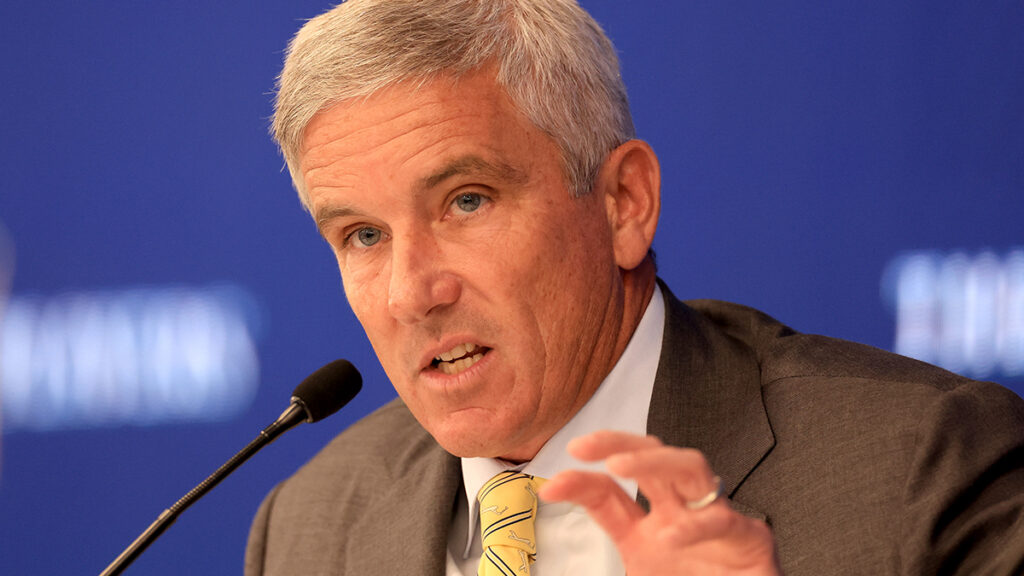
By way of an opening, he said, “Congratulations, you changed golf and you did it in less than a year.” The employees on the call had taken huge professional risks to join LIV and were understandably jittery. Norman radiated confidence, saying the 2024 LIV schedule was nearly finalised. “There will be no operational changes in 2023, 2024, 2025 and into the future,” he said. Then came the mic drop: “LIV is a stand-alone entity and will continue to be that moving forward. And that comes right from the top.”
The man at the top is not Monahan. Or Rory McIlroy or Tiger Woods. Or the lords of the Seminole grill room, Jimmy Dunne and Ed Herlihy, who brokered the truce with LIV through their roles as PGA Tour board members. No, Norman was referring to the new boss of all of them, His Excellency Yasir Al-Rumayyan. H.E. as he is referred to within LIV, is the governor of the Saudi Public Investment Fund, which can alter economies and disrupt industries with its $US650 billion war chest. He is also the chairman of the board of Aramco, the state oil company, making H.E. easily the most powerful person in the world who is not a head of state. His newest title is chairman of the board of the new PIF-Tour entity.
That means Monahan reports to him.
In trying to make sense of how the ground has shifted beneath their feet, PGA Tour loyalists have been quick to point out that the majority of the seats will be held by the tour on the reconfigured board of directors of the new supertour. That’s all window dressing. The overarching lesson in this war between the tours is that money always wins. Al-Rumayyan controls the money, so he controls the future of professional golf, even if he is graciously allowing Monahan to be in charge of the day-to-day bureaucracy.
What does this mean for LIV? Norman has been known to bluff and bluster, so his rah-rah pronouncements must always be taken with a grain of salt. In his fraught meeting with his pissed-off tour membership on June 6 in Toronto, Monahan said, archly, that a full review of LIV’s commercial viability would be conducted at season’s end. Those in the room took that as Monahan writing LIV’s obituary. But Monahan will not decide LIV’s future. Al-Rumayyan will.
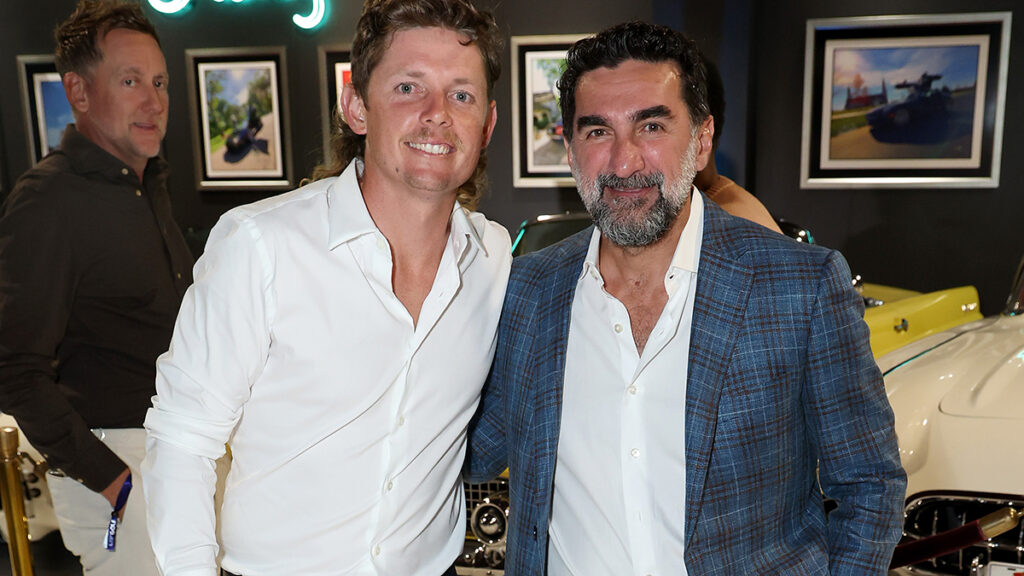
“What people fail to understand is that LIV is H.E.’s baby,” says another LIV executive. “He has poured his heart into its creation.” This included numerous meetings in which Al-Rumayyan fussed over every detail, down to the look of the LIV logo.
Al-Rumayyan served as the midwife during the most tumultuous period in LIV’s creation, the days immediately after Phil Mickelson’s bombshell comments in which he bluntly laid out to me what was really happening in the shadows as the Saudis sought to launch a competitor to the PGA Tour. LIV had been deep in negotiations with Dustin Johnson and Bryson DeChambeau when Mickelson’s comments went public in early 2022, and the folks at LIV were blindsided by the two players’ public pronouncements of fealty to the PGA Tour. “We first heard about it on Twitter,” says one LIV executive. “It was complete and total panic and chaos. We went from the verge of launching to feeling like, Hey, it was a good run but now it’s over.”
Then Al-Rumayyan organised a group call. To that point in the process, he had been a low-key, reserved presence when dealing with his LIV subordinates. About 30 people were on the call, including a handful of Public Investment Fund employees and LIV consultants Andrew McKenna and Ari Fleischer, who had served as George W. Bush’s press secretary.
“I believe in all of you, I believe in what we are building and we are going to press forward,” Al-Rumayyan said with some steel in his voice. “We will do what we have to do to launch this. Just get me 16 players.”
His resolute tone galvanised the entire operation. “We all went into the call with our heads hanging low, feeling so defeated,” says the LIV exec. “Then it became like in “The Wolf Of Wall Street” when Leonardo DiCaprio gives that speech and the whole room goes crazy. When His Excellency finished speaking we were all high-fiving. It was like, Let’s f–king go! We’re gonna f–king do this!”
There are easier ways to make money than building a global golf tour from scratch. It says something about Al-Rumayyan, who holds a degree from Harvard Business School, that the golfer he has become closest to is the dweeby DeChambeau [above]. “He’s a golf nerd. A golf nut,” DeChambeau says. “He plays all the time. He hits the ball straight for not having crazy power. He knows how to get the clubface back to the ball. It’s kind of fun to watch. He has a good putting game, too. I think he loves everything about the game – the camaraderie, the competition, just getting outside and being in nature.”
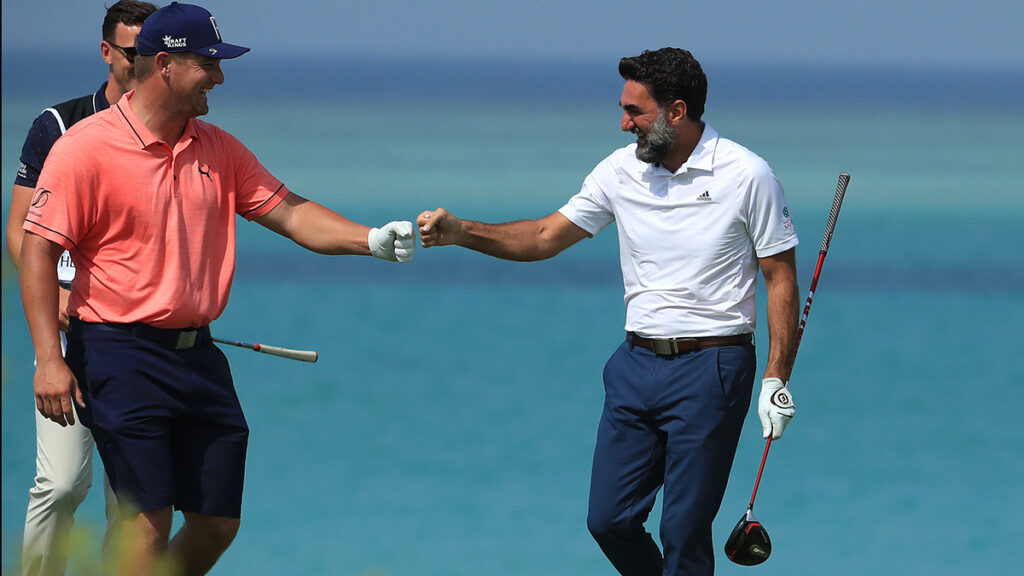
It is Al-Rumayyan who pushed and prodded for the creation of Golf Saudi, which first announced its intentions with a tournament on the 2019 European Tour schedule. “Let’s be honest, the key reason the Saudis have become so involved in golf is because of Yasir’s enduring love for the game,” says Keith Pelley, chief executive of the European Tour. “If he was a volleyball fan, they might be building volleyball arenas and creating a volleyball super league and hosting the volleyball world championships.”
During the annual playing of the Saudi International, Al-Rumayyan’s yacht, parked just off-shore, has become a social hub as he hosts golfers for informal gatherings. “It’s a relaxed environment that offered privacy, or so we thought,” says one player who requested anonymity. “But this was interesting: somehow we started talking about Russia, and just as we were getting going, H.E. nodded at one of his guys, who came over and grabbed both of his cell phones. He set them down next to a speaker and then turned up the music – it was just like in the movies, and then H.E. began speaking very candidly. He nodded towards the phones and said, ‘My own people are always listening.’ I pulled out my phone to hand it to him, but he waved it off and laughed and said, ‘Don’t worry, we are not listening to you – we don’t care enough!’”
Al-Rumayyan has no trouble making the players feel at ease because, for all of his power, he is soft-spoken and courtly, with beautiful manners. He is westernised in his attitudes and his appetites; in the excellent Mohammed bin Salman biography Blood And Oil, by Bradley Hope and Justin Scheck, Al-Rumayyan is described as having “a taste for fine cigars and after-hours bars in Dubai frequented by long-legged, short-skirted Russian women”.
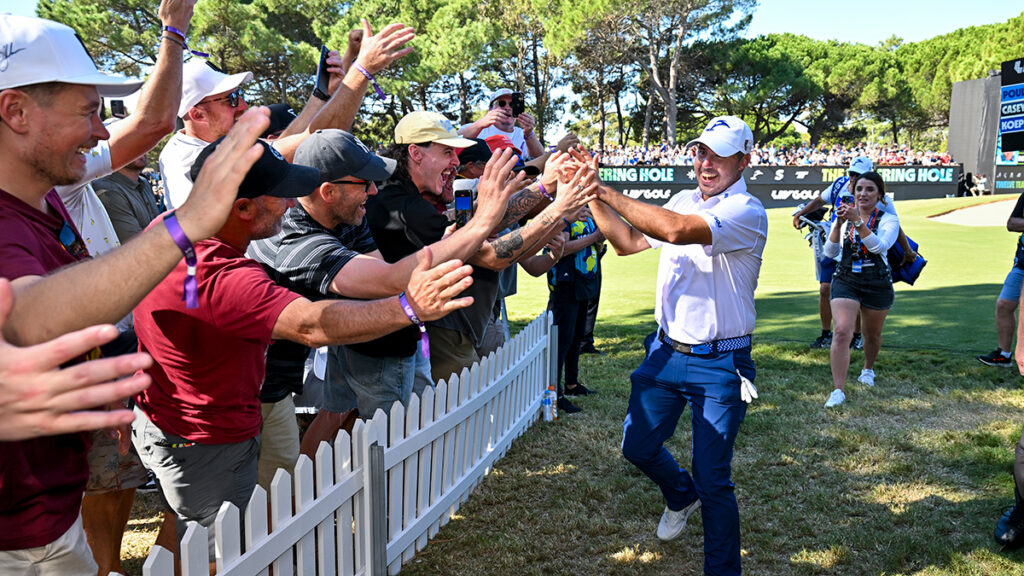
At the completion of LIV’s inaugural tournament in London, in June 2022, Al-Rumayyan was called up to the trophy presentation to give a speech. He drew confused whoops from the crowd when he announced a $US54 million bonus for any LIV golfer who shoots 54 in competition. (Hey, it’s not that outlandish of a thought: Jim Furyk has posted a 58 on the PGA Tour and in 2019 an Irish golfer named David Carey shot 57 at an Alps Tour event, though it was on a par 68.) His speech was otherwise boilerplate, but Al-Rumayyan’s effusiveness, and the bear hugs he received from every player on stage, offered a clue to one of the central mysteries behind LIV: what are the Saudis’ motivations? Al-Rumayyan may have bought his way into the chairmanship of the English Premier football club Newcastle United, and he has been known to have kick-abouts on the field after games, but he’ll never connect with his callow players like he did with Mickelson during their long, leisurely pro-am round in London. The Saudi elite can scoop up the most expensive private residence in London, as the late crown prince Sultan bin Abdul-Aziz did with Rutland Gate, a 62,000-square-foot monstrosity in the shadow of Kensington Palace, but they will never be granted memberships at the old-line, aggressively private golf clubs outside of town. Yet during LIV London, Al-Rumayyan strutted around the Centurion Club as if he owned the place, which he kind of did, at least for one week. The status he enjoyed, the reflected glow of hanging out with famous golfers, the connections he made with the London movers and shakers who played in the pro-am and crowded the three-storey tower of luxury suites… it’s hard to put a price tag on all that, but for a dude who controls an investment fund that is projected to reach a trillion-dollar valuation by 2025 and an oil company that enjoyed $US141 billion in profits for 2022, what’s a few billion dollars between golf buddies?
As always, Al-Rumayyan is playing the long game. He is a close friend and confidante to the crown prince of Saudi Arabia, Mohammed bin Salman. MBS has staked his reign on Vision 2030, his effort to remake the Saudi economy, to say nothing of its society. Creating a robust tourist sector is one of the pillars of Vision 2030. Golf helped put Dubai on the map with tourists (and the international business community), but it’s a crowded city with little memorable terrain; Saudi Arabia has soaring mountains and 2,500 kilometres of coastline that offer vast potential for epic golf destinations. Tapping LIV’s star power has always offered numerous possibilities for cross-pollination – how about a resort featuring a Mickelson-designed golf course and a sleek hotel with interiors curated by Paulina Gretzky?
LIV had to spend lavishly to launch, but by the end of the first, abbreviated season Al-Rumayyan had already tightened the screws. That included relieving Majed Al-Sorour of his day-to-day duties as managing director, a measure of H.E.’s ruthlessness because Al-Sorour is a close friend who has overseen security for Al-Rumayyan’s family.
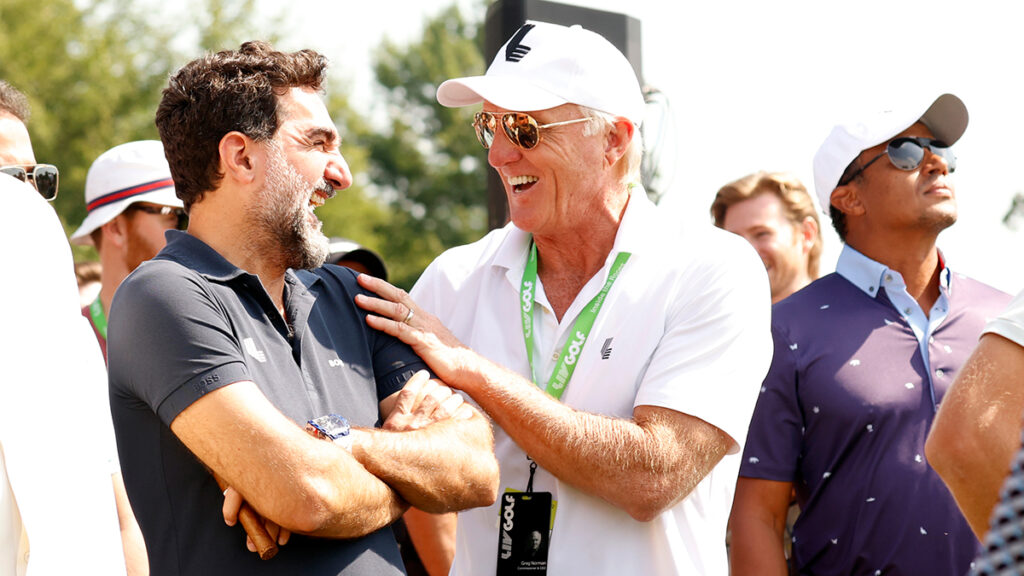
“The PIF guys, they’re laser-focused on the numbers,” says another LIV executive. “They are very smart and very disciplined. Everyone says the Saudis have unlimited money, but that’s because they have made one clever move after another to grow the PIF into what it is. Despite the narrative, they don’t burn up money recklessly. There is always a larger plan and they won’t stop until they have executed that plan.”
And that is the key to understanding LIV’s future. To get its investment back, or even turn a profit, the PIF is counting on selling the 12 LIV team franchises, in which the PIF has a 75 percent equity stake in each. (The team captains own the other 25 percent.) Internally, LIV has thrown around $US500 million valuations, which seemed like science fiction… until the merger. As part of Norman’s all-in call, LIV’s global head of partnerships, Monica Fee, spoke about how her phone has been “ringing off the hook” since the merger announcement, citing Marriott, Anheuser-Busch, Fox and ESPN as those who had already made inquiries. Getting the stamp of approval from the PGA Tour has allowed LIV to be openly embraced by corporate America, at last. (This has always been part of Al-Rumayyan’s vision, too; how many blockbuster deals will the PIF now do by leveraging relationships with the tour’s sponsors?) If LIV can get some of it tournaments on network TV through the tour’s existing deals (still a big unknown), that brings a whole new level of visibility, and value, to the franchises.
So how would all of this work? Conversations with various LIV insiders leads to a consensus of a schedule of maybe a dozen tournaments. Some would be slotted on dark weeks when no traditional tour event is being played, but a handful would be co-sanctioned as part of the new unified schedule. Imagine the rivetting frisson of an event with the six strongest LIV teams and half-a-dozen squads of tour regulars! LIV had already been considering an expansion to 14 teams. Doing so for 2024 would be a way to make whole some of the embittered players who turned down mega-offers. Says one LIV exec, “Now we can finally get Hideki [Matsuyama] and Jon Rahm. I would say every big name on the PGA Tour will get an offer. Except Rory. Nobody wants that little bitch on their team.”
After news of the merger broke, McIlroy said, “I still hate LIV.” He added, “You can’t just welcome back” the golfers who left the PGA Tour and caused “irreparable harm to the tour and started litigation against it”.

Keeping LIV going solves a few problems: the players could be denied full PGA Tour membership, which would prevent them from playing in the FedEx Cup playoffs or enjoying the tour’s famously generous retirement program. This would give McIlroy (and many of his colleagues) a measure of the retribution they crave. But the LIV players could be allowed to accept sponsor’s exemptions into their favourite tour events – the maximum is seven per season for non-members – helping those tournaments attract more stars and further reunify the game. And tour members being able to moonlight at some LIV events would give them access to the bloated purses, which would certainly smooth over some of the hard feelings.
Many, many details still have to be sorted out, including Norman’s role. The new company and tour that the PIF and the PGA Tour are creating are distinctly different from LIV, so perhaps Norman will continue to oversee his fiefdom. If not, someone close to him says, “He has a huge golden parachute. Greg will be fine.” If he doesn’t have a place in the new landscape, Norman can ride off into the sunset having helped achieve the sweeping change he sought for nearly three decades. But that’s the past. The future of golf doesn’t belong to Norman. Or Monahan or McIlroy. It belongs to Yasir Al-Rumayyan.
This article first appeared in Fire Pit Collective, a Golf Digest content partner. Adapted in part from the book LIV AND LET DIE: The Inside Story of the War (and Peace!) Between the PGA Tour and LIV Golf, which can be pre-ordered at amazon.com/LIV-Let-Die-Inside-Between/dp/1668020017



